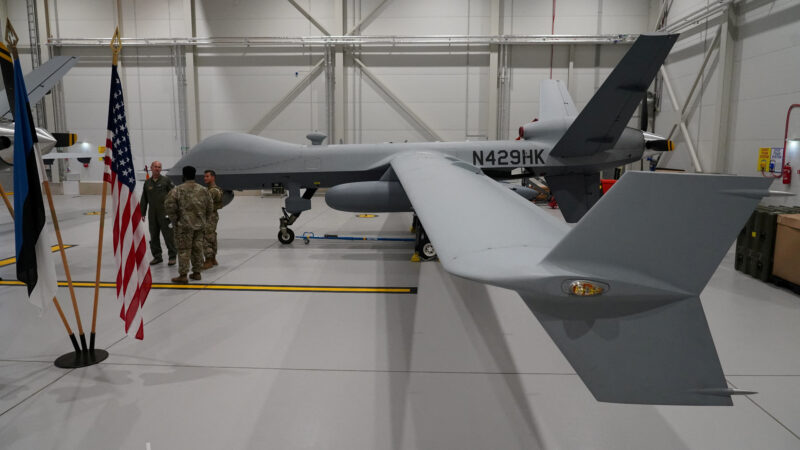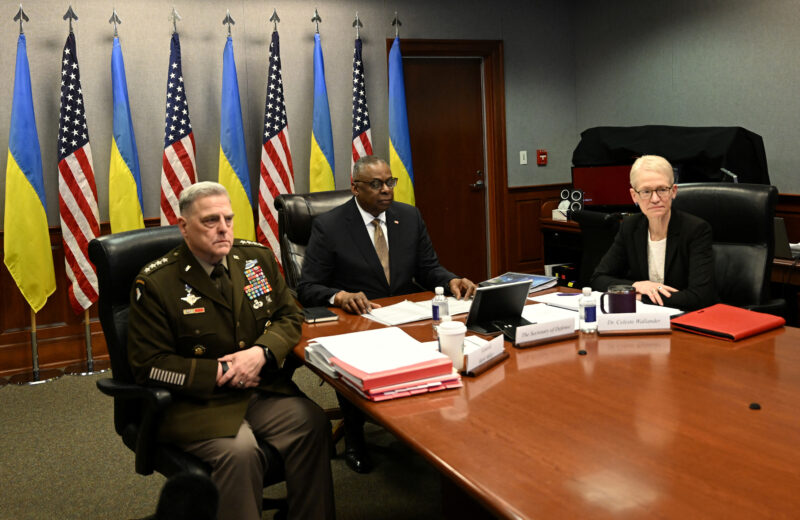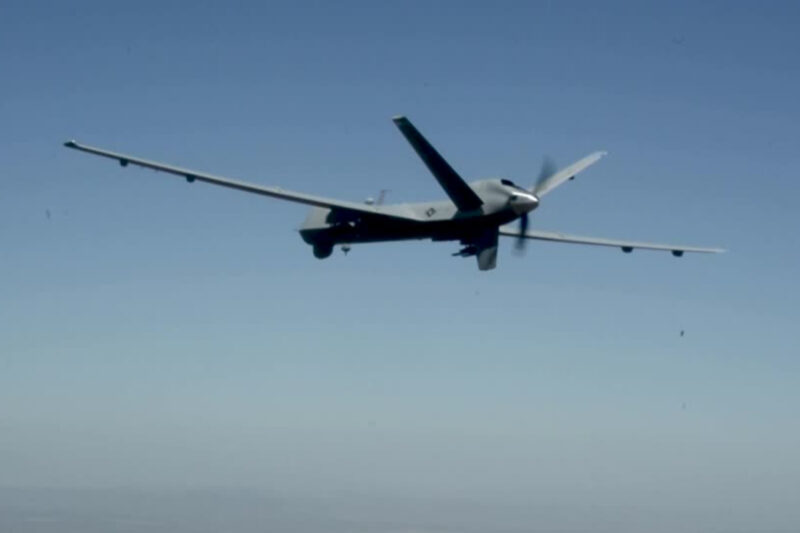WASHINGTON (Reuters) -A U.S military MQ-9 surveillance drone crashed into the Black Sea on Tuesday after being intercepted by Russian fighter jets, in the first such incident since Russia’s invasion of Ukraine over a year ago.
The Pentagon said that one of the Russian Su-27 jets struck the propeller of the drone, making it inoperable, while Russia’s defense ministry blamed “sharp maneuvering” of the unmanned drone for the crash and said that its jets did not make contact.
Although no lives were lost, it was a reminder of the risk of direct confrontation between the United States and Russia over Ukraine, which Moscow invaded over a year ago and which Western allies have supported with intelligence and weapons.
NATO’s Supreme Allied Commander Europe, U.S. Army General Christopher Cavoli, briefed NATO allies about the incident, which was roundly condemned by the White House and the Pentagon — where officials warned of the risk of escalation. The State Department summoned Russia’s ambassador over the incident.

Two Russian Su-27 jets carried out what the U.S. military described as a reckless intercept of the American spy drone. It said the Russian fighter jets dumped fuel on the MQ-9 — possibly trying to blind or damage it — and flew in front of it in unsafe maneuvers.
After around 30 to 40 minutes, at 7:03 a.m. (0603 GMT), one of the jets then collided with the drone, causing it to crash, the U.S. military said.
“Our MQ-9 aircraft was conducting routine operations in international airspace when it was intercepted and hit by a Russian aircraft, resulting in a crash and complete loss of the MQ-9,” U.S. Air Force General James Hecker, who oversees the U.S. Air Force in the region, said in a statement.
“In fact, this unsafe and unprofessional act by the Russians nearly caused both aircraft to crash.”
But Russia’s defense ministry denied the craft made contact. It said the U.S. drone went into the water as a result of “sharp maneuvering” and said the drone was flying with its transponder turned off.

“The Russian fighters did not use their onboard weapons, did not come into contact with the UAV, and returned safely to their home airfield,” the ministry said.
The Black Sea lies between Europe and Asia and is bordered by countries including Ukraine. The Russian ministry said the drone had been detected over the sea near the Crimea peninsula, which Moscow annexed from Ukraine in 2014.
Elisabeth Braw, a senior fellow who researches hybrid and gray-zone threats at the American Enterprise Institute think-tank in Washington, said the incident was unprecedented in the Ukraine war so far.
“This is a very sensitive stage in this conflict because it really is the first direct contact that the public knows about between the West and Russia,” Braw said.
REAPER SURVEILLANCE DRONE
The MQ-9 drone, which is built by General Atomics, has a wingspan of 66 feet (20 meters) and is about 36 feet (11 meters) long. The drone weighs about 4,900 pounds (2,220 kg) when it is empty.
The Pentagon did not say whether the drone was armed, where it was flying precisely, or offer details on its mission, other than to say it was carrying out intelligence, surveillance and reconnaissance activities.
Such an aircraft would likely be engaged in collecting U.S. intelligence related to the war in Ukraine — one of the biggest contributions by the West to Kyiv in its bid to repel invading Russian forces.
The Pentagon declined to say whether it would attempt to recover the MQ-9’s debris but noted that Russia had not done so.
“To my knowledge at this point in time, the Russians have not recovered that aircraft,” said Pentagon spokesperson Brigadier General Patrick Ryder.
While the United States is not sailing warships in the Black Sea, it has routinely been flying surveillance aircraft in and around the area.
The U.S. military said the incident followed a pattern of dangerous behavior by Russian pilots operating near aircraft flown by the U.S. and its allies.
The White House said the details of this incident were unique, however, and would be raised directly by the State Department with their Russian counterparts.
“We have been flying over that airspace consistently now for a year … and we’re going to continue to do that,” said White House National Security Council spokesperson John Kirby.
“We don’t need to have some sort of check-in with the Russians before we fly in international airspace. There’s no requirement to do that nor do we do it,” Kirby added.
The United States summoned Russia’s ambassador to Washington, Anatoly Antonov, over the incident. But Antonov appeared to dismiss U.S. concerns in remarks to Russia’s RIA state news agency.
“We view this incident as a provocation,” Antonov was quoted saying.
(Reporting by Phil Stewart and Idrees Ali; additional reporting by Sabine Siebold, Trevor Hunnicutt, Humeyra Pamuk, Michael Martina and Caleb DavisEditing by Cynthia Osterman and Rosalba O’Brien)

